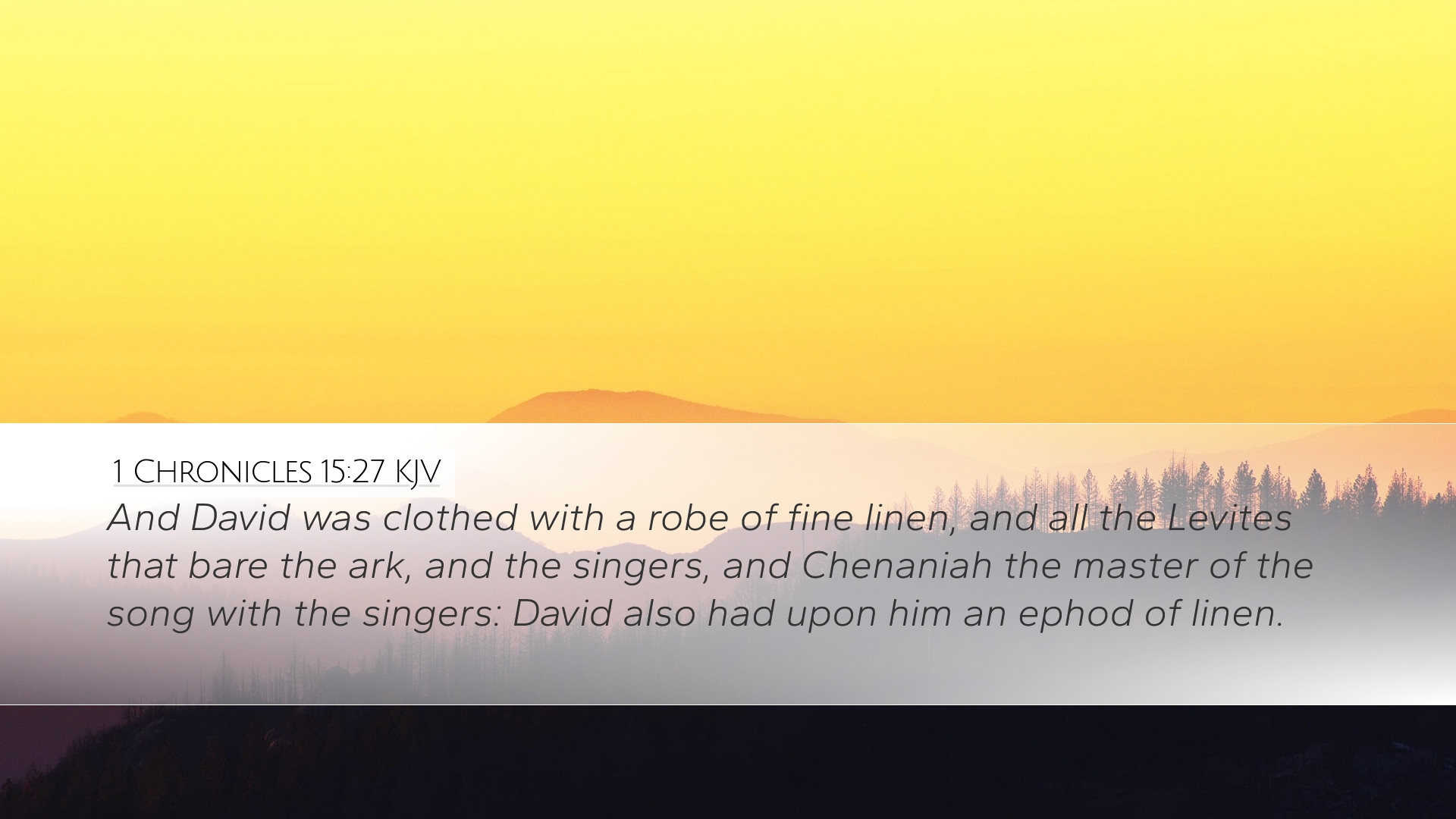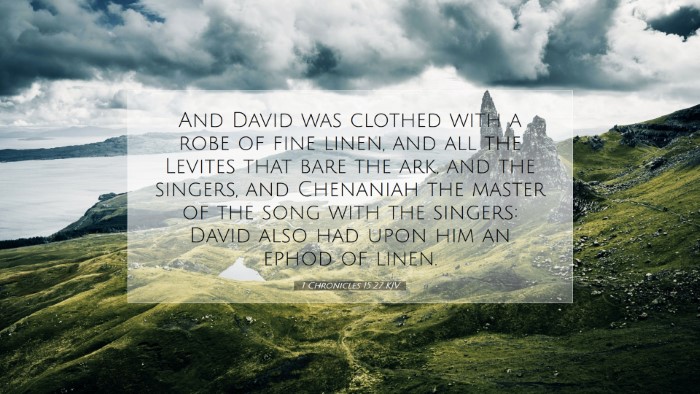Commentary on 1 Chronicles 15:27
1 Chronicles 15:27 states: "And David was clothed with a robe of fine linen, and all the Levites that bare the ark, and the singers, and Chenaniah the master of the song with the singers: David also had upon him an ephod of linen."
Introduction
This remarkable verse comes during a significant moment in the history of Israel, where King David is leading the procession to bring the Ark of the Covenant to Jerusalem. The verse is rich in meaning and conveys lessons about holiness, leadership, and worship. Drawing insights from prominent public domain commentators, we explore the deeper implications of this text.
Contextual Background
The context surrounding Chronicles speaks to a time of restoration and renewal for Israel. David's desire to bring the Ark to Jerusalem symbolizes God's presence among His people. This moment recounts preparation, righteous leadership, and corporate worship.
David's Attire
- Fine Linen Robe
Matthew Henry comments on the choice of David's attire, emphasizing that the robe of fine linen signifies purity and dignity. The use of fine materials reflects the importance of the occasion: the return of the Ark, which signifies divine presence.
- Significance of the Ephod
Albert Barnes highlights that David wearing an ephod—a priestly garment—demonstrates his acknowledgement of spiritual authority and his humble position before God. Unlike previous kings who relied on their military prowess, David exemplifies a king whose leadership is rooted in divine guidance.
Role of the Levites
The Levites play a crucial part in this procession. Their responsibility to carry the Ark not only signifies their chosen status but also the communal nature of worship.
- Significance of the Levites
Adam Clarke observes that the Levites' service in bearing the Ark reflects the congregation's role in the worship of God. This communal approach to worship emphasizes the need for collective participation in honoring God’s presence.
- Chenaniah the Master of the Song
Henry points out that Chenaniah’s leadership among the singers indicates the importance of music in worship—a theme that is consistent throughout biblical history. David's inclusion of singers enhances the atmosphere of celebration and reverence during this event.
Worship and Reverence
This procession involved not only reverence for the Ark but also a public demonstration of faith. David's approach illustrates that worship should be both personal and communal.
- Public vs. Private Worship
Barnes emphasizes the need for public worship led by those in positions of authority. David’s actions serve to encourage others in their worship practices, promoting a culture of reverence—a necessity in Israel at the time.
- Heart of Worship
Clarke points to the emotional and spiritual fervor that must accompany true worship. David's attire of linen and the gathering of community signify that worship involves our entire being, not just ritualistic acts.
Theological Reflections
This verse speaks to broader theological themes that merit consideration:
- The Holiness of God
Henry reflects on the holiness of God and how that is portrayed through the Ark. The attention to detail in the Levites' service and David's attire illustrates an understanding of God’s sacredness that must be upheld during worship.
- God's Presence
Barnes notes that the Ark represents God’s covenant presence, implying that how God is approached in worship is critical.” Each act surrounding this event is poignant in affirming that God dwells among His people.
- The Role of Leadership in Worship
Clarke argues that faithful leadership is typified by humility and an earnest desire for God's will. David exemplifies a leader who submits to God’s authority, characteristics vital for spiritual leaders today.
Conclusion
In summary, 1 Chronicles 15:27 encapsulates a pivotal moment for Israel, demonstrating the significance of worship led by a humble king, the essential role of the Levites, and the overarching theme of God's holiness. Commentaries from Matthew Henry, Albert Barnes, and Adam Clarke provide rich, layered insights that remain pertinent to contemporary applications for pastors, students, theologians, and scholars. As we reflect on this verse, may we engage in worship that mirrors the earnestness and commitment seen in David's actions, understanding the gravity and joy that accompanies the presence of God among His people.


